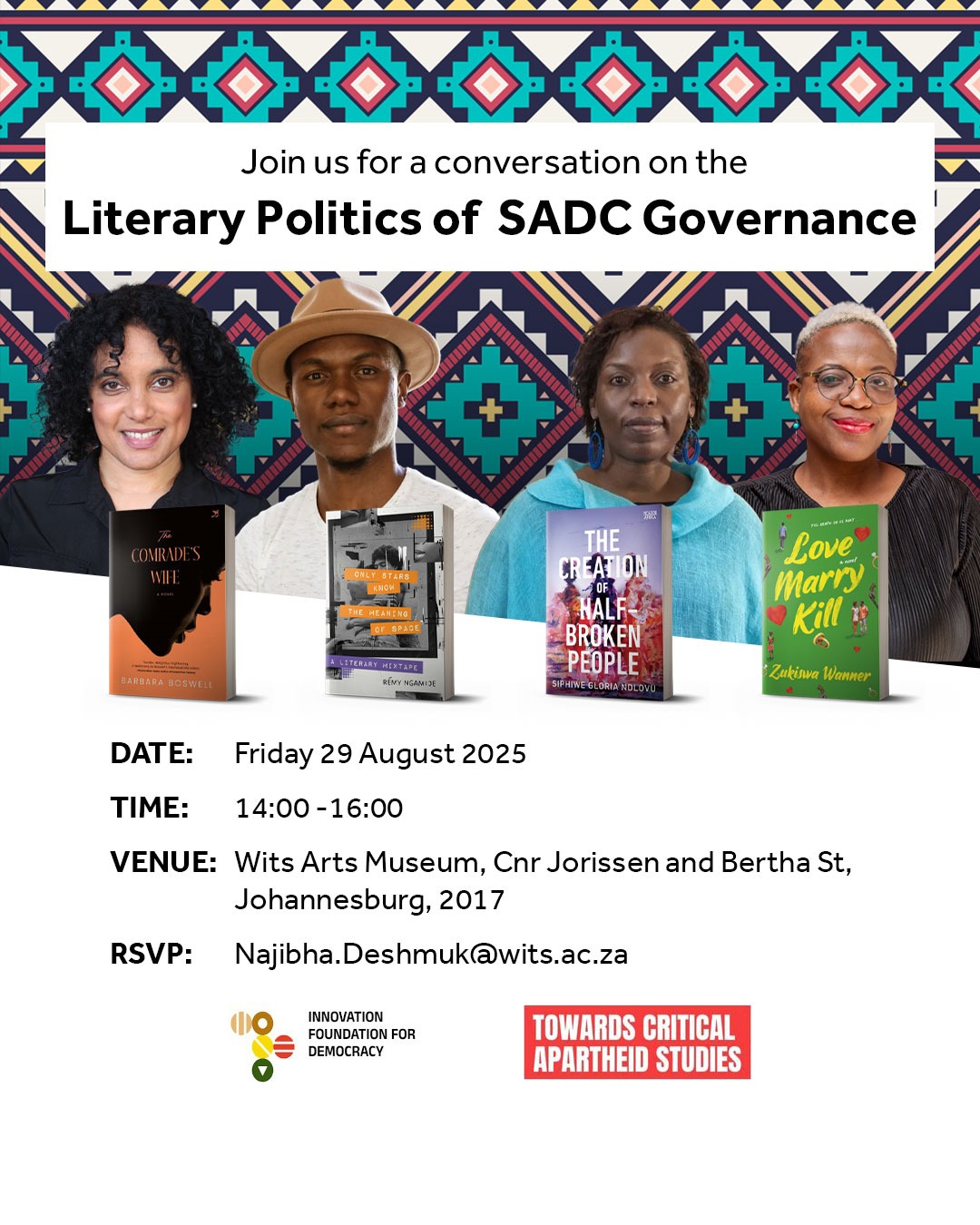Date:
29 August 2025
Localisation:
Johannesburg, South Africa
Wits Arts Museum, Chr Jorissen and Bertha St,
5th Floor, Es’kia Mphahlele Building (Wits University
RSVP:
Najibha.Deshmuk@wits.ac.za
Date:
29 August 2025
Localisation:
Johannesburg, South Africa
Wits Arts Museum, Chr Jorissen and Bertha St,
5th Floor, Es’kia Mphahlele Building (Wits University
RSVP:
Najibha.Deshmuk@wits.ac.za
The year 2024 saw seven countries in the Southern African Development Community (SADC) region hold elections. These were Comoros, Botswana, Madagascar, Mauritius, Mozambique, Namibia, and South Africa. While each experienced various outcomes due to specific national contexts, they highlighted the major political and social shifts occurring in the region. In South Africa, for example, the elections revealed the persistent issue of ethnic nationalism that now dominates the country’s public discourse. This was particularly evident in the lead-up, with political parties mobilising along ethnic lines, creating the ‘in’ and ‘out’ groups, with illegal migrants and ‘foreigners’ portrayed as a creeping threat to the country’s peace and security. The loud and popular calls of ‘Mabahambe’ signalled a growing desire to redraw the lines that once divided us, to erect borders, to re-mark colonial boundaries, and to return to apart-hood. In Botswana, voters removed the Botswana Democratic Party (BDP), which had been in power since 1966. Ushering in a new era for a country with a relatively peaceful democracy. In Namibia, the first woman head of state in the region was elected, perhaps setting a tone for others to follow. Despite our imagined differences, some similarities form the glue that binds us together. South Africa has previously participated in “peacekeeping in regional conflicts” while the Mozambican, Botswana and Namibian elections were marred by alleged interference from Zimbabwe. These democratic imaginaries emerging from the southern tip of the continent invite us to discuss anew post-colonial temporalities and human foldedness throughout the various political and social orders this region has witnessed.
This seminar engages with these developments. Through literature, it reflects on the legacies of colonial borders and migrations in the region, and how these continue to influence socio-political structures. The three literary luminaries, Dr Barbara Boswell, Dr Siphiwe Gloria Ndlovu, and Rémy Ngamije, will be in conversation with Zukiswa Wanner on these themes.
Themes
➢ To reflect on SADC political governance and the persistence of colonial violence.
➢ To explore Southern Africa’s complex histories of migration and borders throughout the changing political landscapes.
➢ To reflect on intergenerational conflicts, identity, and coming of age for Black migrants in South Africa and Namibia.
➢ To observe the layered storytelling that explores the complexity of relationships, both intimate and political. And how this weaves together personal and political struggles.
➢ To reflect on the collusion of colonialism, patriarchy, and capitalism in creating and normalising a certain kind of womanhood.
List of participants
As a publisher, she counts among her authors Angolan author Yara Monteiro whose Portuguese novel Essa Dama Bate Bue became Loose Ties in English; Mukoma wa Ngugi’s We, The Scarred, Daughters of Nandi by Nokuthula Mazibuko Msimang and a children’s anthology edited by Maimouna Jallow, Story Story Story Come, which was translated into Kiswahili, Shona and isiXhosa. Wanner has been a columnist for publications True Love and Mail & Guardian (South Africa); The Star and Nation (Kenya), New African (United Kingdom), and has written for other publications like The New York Times, Süddeutsche Zeitung and The Guardian. The South African Secularist of the Year for 2024 counts among her other accolades and achievements being one of The Continent magazine’s Africans of the Year for 2024, being a 2022 Moi University African Cluster Centre Fellow, 2018 Johannesburg Institute for Advanced Study Fellow and 2016 Danish International Visiting Artist (DIVA). Wanner founded and curated the virtual literary festival, Afrolit Sans Frontieres, which morphed to Virtually Yours and Artistic Encounters, which has taken place in Nairobi, Kenya; Johannesburg, South Africa and Zurich, Switzerland.

This website uses cookies to improve user experience. By using our website you consent to all cookies in accordance with our Cookie Policy.